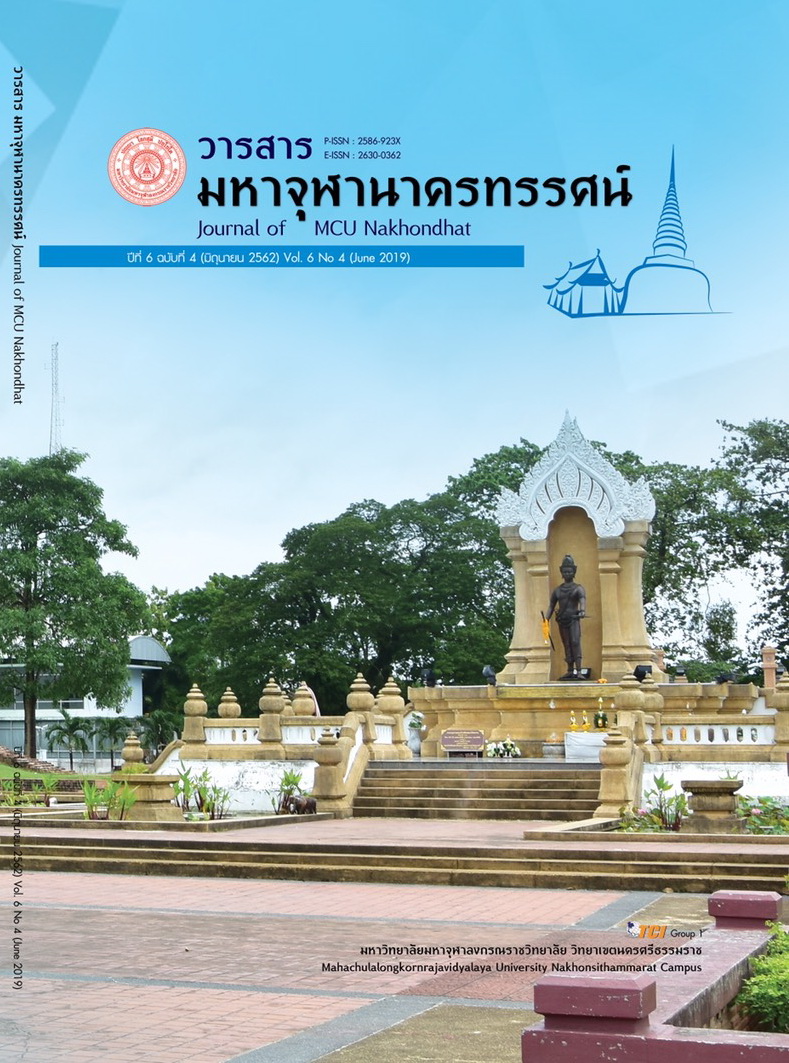ADMINISTRATIVE PROBLEMS STUDYING OF BUDDHIST WAY OF LIFE SCHOOL
Main Article Content
Abstract
The objective of this research is 1) To compare schools with 29 identity assessment scores to become Buddhist way of life school. 2) To analyze schools that have 29 identity assessment scores to become Buddhist way of life school and 3) Administrative problems studying of Buddhist way of life school in Songkhla Province with the population used in the research totally 54 people, included 1) Executives or school administrators who applied to join with Buddhist way of life school totally 4 people and 2) People who are involved in the administration of Buddhist way of life school totally 50 people. The tools used in the research are structured in-depth interviews with 4 aspects are 1) Management policy 2) Planning Operation 3) Supervision, follow-up and 4) Problems and obstacles in administrative and suggestions, Research methodology by using Mixed Methods Research. Statistic used for finding tool quality is Content Validity and statistic used in research is Frequencies and Percentage
Research result found that:
1.The result of comparing schools with 29 identity assessment scores to become Buddhist way of life school found that schools with the highest score can proceed through the evaluation criteria with 29 identity assessment to become Buddhist way of life school accounted for 97.59 percent and the school with the lowest score can’t proceed according to 29 identity assessment accounted for 63.62 percent
2.The analysis result of the school with 29 identity assessment scores to become Buddhist way of life school with assessment period 12 months, year 2017, Data from ARS 7 (2) and ARS 15 (1) with the highest score separated by aspects are Physical, Teaching and learning, Behavior of school administrators, teachers and students, Buddha's day activities and the promotion of Buddhist ways found that the school with the highest score for the Physical with the highest assessment score accounted for 99.35 percent and the school with the lowest score for Behavior of school administrators, teachers and students with the score assessment score accounted for 78 percent
3.The study results from in-depth interviews found that the administrative problem of Buddhist way of life school, Songkhla province. Office of Educational Service Area in each area has fulfilled the policy from Smart OBEC of Buddhist way of life school project in the strategy to proceed the process to make it achieve the objectives. Determined to emphasize moral development and ethics. School administrators have responded to the policy in the formulation of the strategic plan to achieve the goal of a Buddhist way of life school. Teachers and students participate in the planning of operations together with the management team. Performing the duties as planned and received cooperation from all parties in Duty. Parents and community representatives participate in the development of schools and Buddhist activities. Participated in the planning meeting with the school board. And administrative problems of Buddhist way of life school, Songkhla Province found that the supervision, follow-up, evaluation of Office of Educational Service Area that still encountered the problem in some indicators identities still follow-up evaluation but lack of field work. Director or teachers who are responsible for the Buddhist way of life school do not care, do not see the importance of entering the assessment report through the system on schedule. Therefore, it cannot be done on time of assessment. Discontinuity policy and lack of budget of training and development for the responsible person who came to take care the system to understand the Buddhist way of life school project. Lack of data collection form of evaluation report from the school, lack of information system.
Operation according to 29 identities to become a Buddhist way of life school. In some identities the school cannot perform. Therefore, it is appropriate to revise and change the new identity in order to be compatible with the multicultural society or should change the identity assessment method by focusing on developing desirable characteristics of empirical students rather than Physical assessment.
Article Details
References
คณะกรรมการศึกษาแห่งชาติ. (2551). กรอบวิสัยทัศน์และทิศทางแผนพัฒนาเศรษฐกิจ ฉบับที่ 9 ตามมติคณะรัฐมนตรี. กรุงเทพมหานคร: โรงพิมพ์คุรุสภา.
ณัฎฐกิตติ์ ศรีสันต์. (2548). ปัญหาและแนวทางการพัฒนาการดำเนินงานโรงเรียนวิถีพุทธ ในภาคตะวันออก. มหาบัณฑิต สาขาวิชาการบริหารการศึกษา มหาวิทยาลัยบูรพา.
พระประวิทย์ สมสนุก และคณะ. (2549). การศึกษาการบริหารโรงเรียนวิถีพุทธในสังกัดสำนักงานเขต พื้นที่การศึกษากรุงเทพมหานคร เขต 1. ใน วิทยานิพนธ์การศึกษามหาบัณฑิต คณะครุศาสตร์ สาขาวิชาการบริหารการศึกษา. มหาวิทยาลัยนเรศวร.
พัชรพร เทิดธรรมไพศาล. (2550). ปัจจัยที่ส่งผลต่อประสิทธิผลของโรงเรียนวิถีพุทธะการวิเคราะห์เชิงปริมาณและคุณภาพ. กรุงเทพมหานคร: ศูนย์ส่งเสริมและพัฒนาพลังแผ่นดินเชิงคุณธรรม.
สำนักงานเขตพื้นที่การศึกษาประถมศึกษาสงขลา เขต 1. (2560). รายการผลการดำเนินงานโรงเรียนวิถีพุทธ ประจำปี 2560. สงขลา. สงขลา: สำนักงานศึกษาธิการจังหวัดสงขลา.
สำนักงานเขตพื้นที่การศึกษาประถมศึกษาสงขลา เขต 2. (2560). รายการผลการดำเนินงานโรงเรียนวิถีพุทธ ประจำปี 2560. สงขลา. สงขลา: สำนักงานศึกษาธิการจังหวัดสงขลา.
สำนักงานเขตพื้นที่การศึกษาประถมศึกษาสงขลา เขต 3. (2560). รายการผลการดำเนินงานโรงเรียนวิถีพุทธ ประจำปี 2560. สงขลา. สงขลา: สำนักงานศึกษาธิการจังหวัดสงขลา.
สำนักงานเขตพื้นที่การศึกษามัธยมศึกษาสงขลา เขต 16. (2560). รายการผลการดำเนินงานโรงเรียนวิถีพุทธ ประจำปี 2560. สงขลา: สำนักงานศึกษาธิการจังหวัดสงขลา.
สำนักงานศึกษาธิการสงขลา. (2560). รายการผลการดำเนินงานโรงเรียนวิถีพุทธ ประจำปี 2560. สงขลา.: สำนักงานศึกษาธิการจังหวัดสงขลา.
สำนักพัฒนานวัตกรรมการจัดการศึกษา. (2560). ข้อมูลโรงเรียนวิถีพุทธจังหวัดสงขลา. เรียกใช้เมื่อ 30 ธันวาคม 2560 จาก : http://www.vitheebuddha.com.
อัมพร บำรุงผล. (2549). การบริหารโรงเรียนวิถีพุทธของสถานศึกษาขั้นพื้นฐานสังกัดสานักงานเขต พื้นที่การศึกษาชลบุรี เขต 3. ใน วิทยานิพนธ์มหาบัณฑิต คณะครุศาสตร์ สาขาวิชาการบริหารการศึกษา. มหาวิทยาลัยราชภัฎราชนครินทร์.


